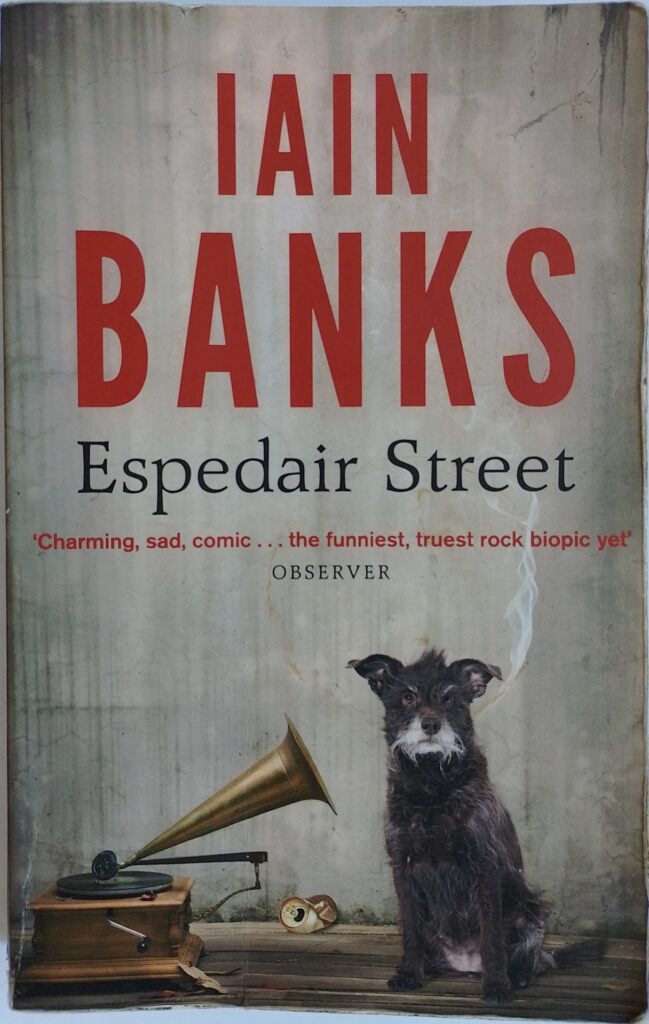First Published 1987. Abacus paperback, 2013, pp 362, c.97,000 words.
Mock-rock biopics are fertile ground to plough owing to the excesses of prog-rock and heavy metal bands. This is Spinal Tap, the 1984 film, set a blistering pace with several snippets become culturally embedded such as ‘turning it up to eleven.’ This is Banks’ take on the genre.
Daniel Weir comes from the wrong side of the tracks: Ferguslie Park, a suburb of Paisley, which ‘lay in a triangle of land formed by three railway lines, so no matter what direction you approached it from, it was always on the wrong side of the tracks.’ [p21] He comes from a Catholic family, and his father is in jail after a history of domestic violence and desertion, he has many brothers and sisters. He is tall, ugly, ungainly, but as it happens, a very talented rock song-writer. He is taken up by a local band that also happens to have very a talented guitarist and a top-class lead singer. The group achieves almost instant superstardom in the mid-1970s. This is Weir’s autobiography.
A rock biopic provides a superb backdrop for Banks to display his talent for humour and descriptions of low-life, as well as some debauched high-life. It rings horribly true. He is a consummate master of the depressing circumstances that many of the poor grow up in: ‘feet crunching on the broken glass that was Ferguslie’s equivalent of the gravel drive’ [p23]. One is not quite sure whether to feel sorry for people in such circumstances or despair at how much of the grot is self-inflicted. Banks has a sneaking admiration for the middle-class virtues of delayed satisfaction and restraint: ‘They can keep drink in the house without having to drink it all. Not like your working class at all.’ [p137] Of course there is an ironic echo in there somewhere – Banks likes to pose as a man of the left, despising the rich, but one can’t help feeling that he realises that his politics clash with his observation of the real world. Rather surprisingly, the big guns of the music and record industry don’t come in for much of a pasting; perhaps that was too easy and well mined a target. The politics don’t spoil the enjoyment and can be relished, ignored or laughed at according to your taste.
Scattered through this are some real literary gems that any author would be jealous of. For example when the group are making an early album, they are recording it at a country house owned by the record company’s boss. Weir is taking a windy, autumnal walk in the park with one of the backing singers who he fancies: ‘… so that for a long dizzying moment we seemed to walk and stand quite still together, travelling islands caught within that bright, chaotic flow, our ankles tickled by the brittle flood, our eyes tricked by the relative movement of those charging, rolling, whispering leaves.’ [p142] Of course that is a metaphor for the whole rock band experience.
Weir’s ugliness didn’t present him from having a following, even though it might not have been on the scale of his prettier band-mates. ‘Kids stuck posters of me up on their walls to shock their parents… …something menacing but contained; a safe cheap thrill and a kind of token totem of glossy threat. … maybe they just found my big stupid face funny.’ [p162] Somehow, for all his physical deficiencies (as well as personality defects), he doesn’t seem to have trouble in attracting female company; of course he is soon extremely rich. He is plagued by doubt though: ‘Christine … no, she loved me for a while, or said she did, but it was as a friend, I think … Maybe even as a pet.’ [p162]
Banks is often very good on human nature: ‘There are times when you can’t do the sensible thing, when you can’t act like a responsible adult at all; you just have to do whatever insane thing comes into your head. …and when the rest of us do it we end up looking like total idiots. But when’s that ever stopped us?’ [p340/1] Or: ‘I am totally selfish when I’m being selfless. … We are all selfish. … Throw yourself on the grenade; you do so knowing you are the hero, and there will be no more times when the terror of death might make you turn and flee.’ [p352] That brought to mind Conrad’s Lord Jim where a man was presented with a terrible choice. What would I have really done, rather than what would I like to think I would have done?
One literary prize was always likely to elude Banks is the “Bad Sex in Fiction Award”. He does write sex scenes, but they are mildly erotic rather than pornographic, and celebrate the tender passions, the comedy and uncertainty that so often heralds a first sexual encounter. As is often the case, women control access to sex and display greater maturity and carnal knowledge. [p243]
Yes, this has its Tap-esk moments, but it’s well worth reading for its huge entertainment value and its probes into human nature.
© William John Graham, April 2023

